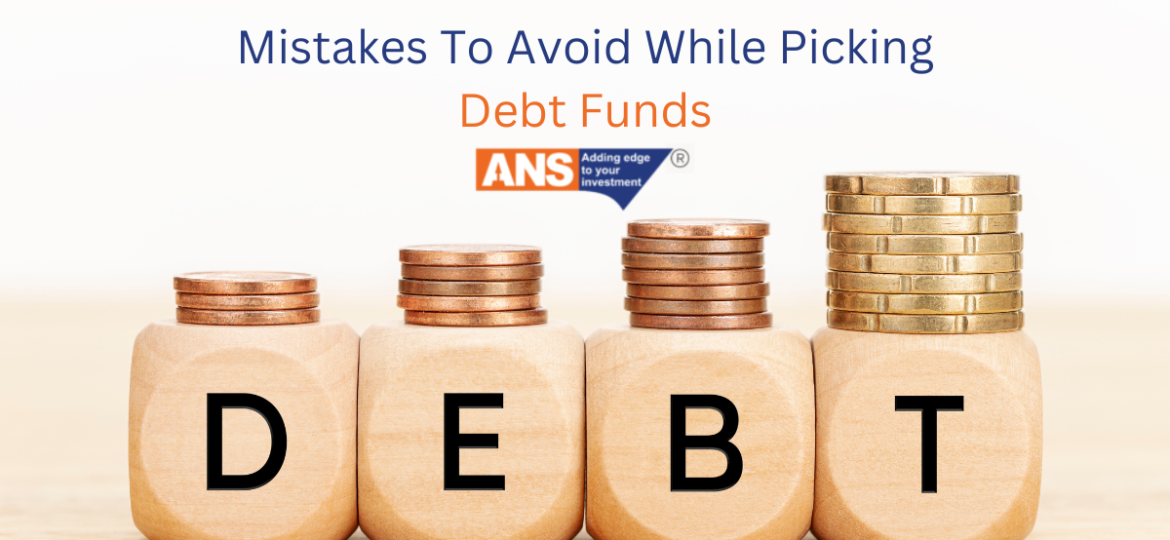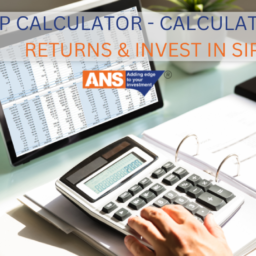
Lending an advance by selling debt instruments seems to be a daunting task, especially when you are unsure about the risk-return policies. But by having the right choice of investors & organizations on the opposite end, you can enjoy the frequent interest income and capital appreciation gained in the future.
What is a Debt Fund?
Debt Funds are a magnificent tax-effective investment possibility to accomplish short-term or medium-term goals.
These debt fund schemes add steadiness & secureness to your portfolio. While picking suitable funds among the wide variety of debt funds, be careful with your choices since the risk-return profiles vary for distinct categorizations of funds.

Mistakes to avoid while picking a debt fund-
Let us look at the list of some of the most common & often-repeated mistakes that you must avoid while planning your investment in Debt Funds
- Neglecting Interest Rate Risk in Debt Funds
Debt Funds lay out money on interest-generating resources namely corporate bonds, government bonds, treasury bills, commercial paper, etc. Similar to stocks, bonds get exchanged in the marketplace and their charges also move up and down.
A significant impelling force for the shift in bond prices is dependent on how the interest rates in the economy change. Bond prices have a contrary relationship with interest rates.
Debt Funds that primarily invest in bonds produce higher returns when interest rates decline, as the cost of their underlying holdings goes up. This depicts their NAV (value of every mutual fund component) and the NAV also rises. In contrast, returns from Debt Funds go down when interest rate rises since the value of their underlying holdings declines.
The probability of a rise or decline in the bond price also depends on the bond holding period. The longer the bond duration, the higher the volatility, thereby increasing interest rate risk. Conversely, bonds with shorter maturity will have shorter durations and are less sensitive & volatile to changing interest rates.
Therefore, when you invest in a Debt Fund framework, inspect if the interest rate risk taken is in line with your risk appetite.
Crucial parameters including Average Maturity, Macaulay Duration, and Modified Duration can give beneficial insight into how future interest rates will impact your scheme’s performance.
- Not Picking Debt Funds Based on Goal/ Not Specifying Your Purpose
There are 16 wide varieties of Debt Funds & all of which carry varied levels of risk and rates of return.
Investing in any of the categories of debt funds has a purpose behind making a specific move.
It can be either to have some stable allocation for producing regular income, to balance the portfolio risk, or to associate some long-term fixed income allocation to the overall portfolio.
Specifying your goals for investing in debt funds is essential; as it helps you choose the right category of debt funds to invest in. If your goal isn’t specified, there is a probability you will end up picking the wrong match of debt category funds for your goal.
For example, if you have a short-term investment requirement, say a fund that can hit maturity in 3 months, then investing in a debt security that has a maturity period of 2-3 years won’t be suitable as per the circumstances.
Once you are sure about how long you want to stay invested in any debt fund security and what kind of risk you are ready to take, it will guide you to pick the relevant Debt Funds.
Here are some category wise Debt Fund investment horizons explained below-
- 3-6 months – Liquid funds
- 6-12 months – Ultra Short Duration funds
- 1-2 years – Money Market Fund, Low Duration Fund
- 2-4 years – Short Duration Funds, Corporate Bond Funds, Banking & PSU Funds
- Avoid Quality Checking of Holdings in Debt Funds (Credit Risk)
You might be aware of personal credit scores like the CIBIL score. This score depicts how well you have responded to repaying your loans in the past.
Well, this credit score of yours plays a pivotal role in determining what interest rate you will have to pay on your future loans. A good credit score signifies you can acquire loans at lower interest rates and if you attain a bad credit history, you might get loans at a higher interest rate.
Based on an individual & company’s financial management, debt repayment ability, and history, credit ratings are allotted to them.
A lower credit rating carries a higher risk of default. So, you might have to counteract the higher risk by exhibiting higher interest rates.
To consign a better-quality return, if a Debt Fund is investing in lower-rated papers, it is collecting higher credit risk than its fellows. This is why a Debt Fund attains considerably higher returns than most funds in their category.
Therefore, you should be careful while selecting a Debt Fund and checking the quality of debt holdings.
- Expecting Returns as Your Prior Objective
Debt funds are mainly meant for stable returns at lower risk. So, if you prefer to invest in debt funds for higher returns, that shows you need to select funds attaining a higher risk in the portfolio. This high return can come at the cost of the quality, leading to losses.
So, while choosing to invest in the debt fund category, if your objective is to acquire stable returns, pick schemes with portfolios that have higher quality, even if it comes at the cost of return.
- Omitting the Average Maturity period of the Portfolio
Omitting the average maturity time of the debt scheme won’t sound like a good judgment if you’re planning to invest. People generally prefer debt funds moreover other funds, since it provides efficient and stable returns at a lower risk rate.
If you opt for funds with a lower maturity duration than 2 years, you might end up receiving low returns and if you choose funds with a higher maturity period than 2 years, there are chances of an increase in volatility & returns too in your portfolio.
Conclusion
Debt Funds, being a part of your core portfolio, reduce volatility and offer stable returns. But it is critical to identify the risk-return spectrum of each debt fund category rather than considering all of them as the same.
You can select the right Debt Fund by looking for schemes that suit your investment horizon. Debt Funds basically should be more about adding stability to your portfolio and not the higher returns.















